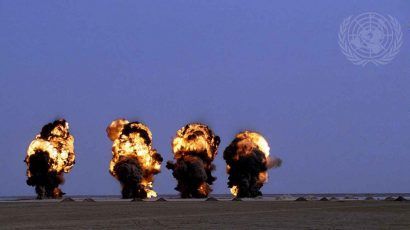Search results for nuclear terrorism
The Bulletin of the Atomic Scientists and Routledge, Taylor and Francis Group are delighted to announce that the Bulletin will be moving into a partnership with Routledge, part of the Taylor and Francis Group, effective January 1, 2016. Today, the rise in geo-political tensions between the West and Russia, ongoing international environmental debates on climate … Continued
President Ronald Reagan, the USSR’s Mikhail Gorbachev and the INF Treaty
Virtual Tour: Turn Back the Clock “] The world’s nuclear arsenal ballooned in the mid-1980s. Together, the United States and the Soviet Union possessed a staggering 64,099 nuclear warheads. Yet within a few years, US President Ronald Reagan and Soviet General Secretary Mikhail Gorbachev forged a mutual trust that helped eliminate an entire category of … Continued
Zombie lessons
Watching the spread of a deadly pandemic like the one in World War Z can promote better public and animal health.
Policy makers should plan for superintelligent AI, even if it never happens
Policymakers should plan for artificial superintelligence systems by building governing systems and necessary infrastructure.
The promise of the Syrian chemical weapons plan
The Russia-US deal to eliminate Damascus’ stockpile has achieved a great deal—far more than the alternative would have accomplished
Which drone future will Americans choose?
The decisions US leaders make now over unmanned aerial vehicles will have enormous consequences.
A new international biorisks organization is needed to ensure security
Ralf Trapp clarified my concerns and points to the core of the problem: determining what chemicals are for law enforcement and which legal interpretations States Parties to the Chemical Weapons Convention (CWC) will accept? Recent advances in biotechnology are outstripping legal and normative safeguards designed to protect us from the misuse of new technologies. This … Continued
Artificial intelligence and disruptive technology
Virtual Tour: Turn Back the Clock “] Since its founding, the Bulletin’s scientists have called attention to the uses of new technologies that possess the potential to “change life on Earth as we know it.” Like the nuclear energy that atomic scientists helped unleash in the 1940s, these technologies have the power to transform our … Continued
Between two wars
In this article, Rolf Ekéus, Swedish ambassador and UNSCOM executive chair from 1991 to 1997 gives his perspective on the UNSCOM process.
Es mejor soportar los males que sabemos
En cierta medida, el control de las armas nucleares y el desarme nuclear van de la mano. Sin embargo, cuando se enfrentan a la cuestión de la disuasión y su utilidad, se apartan rápidamente. Este es el argumento central del tercer artículo de mi colega de mesa redonda, Joelien Pretorius, y estoy de acuerdo. Ahora … Continued
Coronavirus overview: How political ideology and governmental incompetence can kill you
America First and its Russian and Chinese analogs may be temporarily profitable in terms of domestic political benefit for sloganeering national leaders. As the coronavirus pandemic is making clear, however, nationalistic ideologies can be dangerous to human health, sometimes on a vast scale.
Why biodefense research is necessary
Bioscience and biotechnology have an inherent dual-use nature, and genetic information, as an integral part of bioscience, has the same nature. So, yes, the availability of genetic information is dangerous. Because the potential misuse of this information poses a threat, the information needs to be controlled or regulated. What these control mechanism should look like … Continued
Why missile proliferation is so hard to stop
It is a supreme irony that even if the spread of missile technology can be constrained, proliferation of missiles will likely remain unconstrained. Today, more than 30 countries possess missiles with ranges of 150 kilometers or greater. In 2016 alone, nations including China, India, Iran, Israel, North Korea, Pakistan, Russia, and the United States have … Continued
Radiation risks are real. But no cause for radiophobia.
A woman’s son broke his leg and had an X-ray. Three weeks later, she was still so afraid of radiation that she would not hug him.
Science for peace
Earlier in Round Three, my colleague Akira Kawasaki discussed the dichotomy between Japan's stated principles, which advocate disarmament, and its policies, which do not advance this cause. Mustafa Kibaroglu performed a similar analysis for Turkey. The same dynamic exists in other places. For example, the United Kingdom is committed to nuclear disarmament under the Nuclear … Continued
Asia Meridional: más allá de la gestión de las crisis
En lugar de «demasiado Tío Sam», como expresó Rabia Akhtar en un subtítulo de su primer ensayo, el problema en Asia Meridional es «muy poco Tío Sam». A Akhtar le preocupa la incapacidad de India y Pakistán de «madurar» y terminar con la dependencia de Estados Unidos para la gestión de las crisis nucleares. Comparto … Continued
Autonomous and unaccountable
Though this roundtable's participants agreed in Round One that autonomous weapons should be subject to international regulation, no one spent much time discussing how a regulatory system might be created. Perhaps that's because all three authors concentrated on points that—although difficult to disagree with—were nonetheless important to establish at the outset. Civilian safety should be … Continued
Italian utility in hot water for draining a picturesque lake to send water to Rome
The legal battle the local community is waging against Acea could set an important new environmental precedent in the European Union.
Facing the myths surrounding proliferation financing
How are you to stop proliferation financing if you can't distinguish it from run-of-the-mill trade?
The problems with the Department of Homeland Security
In response to 9/11, Congress created the Department of Homeland Security (DHS), a massive cabinet-level agency that consolidated 22 departments and agencies and almost 200,000 federal employees. Its goal was to improve domestic security coordination and communication.









